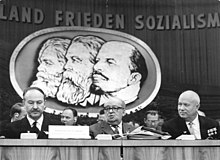Boris Nikolayevich Ponomarev
Boris Ponomarev ( Russian Борис Николаевич Пономарёв born January 4;; also cited as Ponomarev jul. / 17th January 1905 greg. In Zaraysk ; † 21st December 1995 in Moscow ) was a Soviet historian and politician .
biography
The historian
Ponomarjow was from 1920 to 1923 in Sarayisk Komsomolze in the Social Democratic Workers' Party of Russia . He studied from 1926 and became a historian. From 1932 to 1934 he was director of a historical institute of the party and from 1934 to 1937 he was a professor on the board of directors of the historical institute of the party of the Moscow Committee.
In the Comintern
Under the leadership of Georgi Dimitrov , he was political advisor in the Communist International (Comintern), from 1936 until the dissolution of the Comintern in 1943, as head of a group and at times also head of Herbert Wehner during his time in exile in Moscow (at that time the code name : Kurt Funk). Wehner writes: He “... was personally characterized by great restraint, pronounced modesty in demeanor and the ability to listen to his counterpart; he belonged to a special type of young Russian functionaries who had gone through the school of Stalin's personal environment and the art of adaptation…. had acquired to perfection. ”He was considered one of the ideologues of the CPSU . He was first among the historians of the USSR and in 1962 editor of the official history of the Communist Party of the Soviet Union (CPSU).
In the Central Committee Secretariat
Ponomarjow, the eternal secretary of the Central Committee (ZK) of the CPSU, the typical " apparatchik ", initially worked as an employee and since 1955 as a department head in the Central Committee and was responsible for the international communist movement, especially for the "brother parties" that did not acted in the Warsaw Pact area. Nikita Khrushchev promoted the opponent of Stalinism and then Mikhail Suslow , the real "party ideologist".
25 years Central Committee secretary
From 1961 to 1986, over 25 years, he was the Central Committee secretary responsible for international affairs. From 1972 to 1986 he was promoted to a candidate for the Politburo , but he never became a full member of the highest political body in the USSR, the Politburo of the CPSU . Nonetheless, when it came to international politics, he was one of the most powerful Soviet politicians in the days when Khrushchev , Brezhnev , Andropov and Chernenko were general secretaries of the party.
The opponent of Stalin was a conservative advocate of a Soviet foreign policy of strength and peaceful coexistence , but only if it was of use to the USSR. He followed the new Ostpolitik of the German government under Brandt and Scheel (1969 to 1975) with caution. Herbert Wehner (1973) and Egon Bahr (1982) endeavored with him to gain a better understanding of the political camps and to militarily disarm the systems.
Ponomarev was in favor of the military invasion of Czechoslovakia (1968) as well as the one in Afghanistan (1981). He rejected the new ways (The Third Way) of the communist parties in the West ( Eurocommunism ) for ideological reasons and therefore had violent dissent and a. with the Italian Communist Party leader Palmiro Togliatti .
Honors
- Ponomarev received several high academic awards.
- Member of the USSR Science Council since 1962
- Since 1991 academic member of the Russian Academy of Sciences
literature
- Michel Tatu: Power and Powerlessness in the Kremlin. Ullstein, Frankfurt 1967
- Merle Fainsod : How Russia is governed. Kiepenheuer & Witsch, 1965
- Herbert Wehner : Testimony, personal notes 1929-1942. Mitteldeutscher Verlag, Leipzig 1990, ISBN 3-354-00698-6
- Mikhail Gorbachev : Memories. Siedler, Berlin 1995, ISBN 3-88680-524-7
- Egon Bahr : In my time. Settlers, 1998, ISBN 3-442-75503-4
- Valentin Falin : Political Memories. Droemer Knauer, Munich 1993, ISBN 3-426-26657-1
Web links
- Literature by and about Boris N. Ponomarev in the catalog of the German National Library
- Article Boris Nikolajewitsch Ponomarjow in the Great Soviet Encyclopedia (BSE) , 3rd edition 1969–1978 (Russian)
| personal data | |
|---|---|
| SURNAME | Ponomarjow, Boris Nikolajewitsch |
| ALTERNATIVE NAMES | Пономарёв, Борис Николаевич (Russian) |
| BRIEF DESCRIPTION | Soviet historian and politician |
| DATE OF BIRTH | January 17, 1905 |
| PLACE OF BIRTH | Saraisk |
| DATE OF DEATH | December 21, 1995 |
| Place of death | Moscow |
